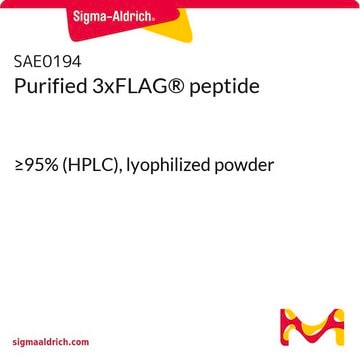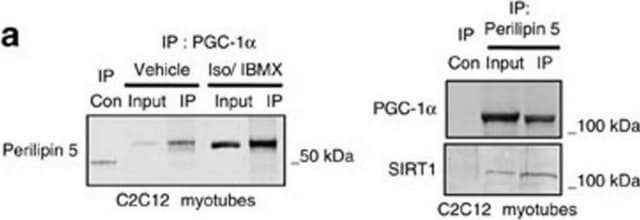CS1040
SIRT1 Assay Kit
sufficient for 100 assays
Sinónimos:
SIRT1 Activity Assay
Iniciar sesiónpara Ver la Fijación de precios por contrato y de la organización
About This Item
UNSPSC Code:
12161503
NACRES:
NA.84
Productos recomendados
usage
sufficient for 100 assays
Quality Level
shipped in
dry ice
storage temp.
−20°C
Gene Information
human ... SIRT1(23411)
General description
The SIRT1 Assay Kit offers all the reagents required for the measurement of purified SIRT1 activity and for screening of inhibitors/activators.
The assay procedure is based on a two-step enzymatic reaction. The first step is deacetylation by SIRT1 of a substrate that contains an acetylated lysine side chain. The second step is the cleavage of the deacetylated substrate by the Developing Solution and the release of a highly fluorescent group. The measured fluorescence is directly proportional to the deacetylation activity of the enzyme in the sample.
The assay procedure is based on a two-step enzymatic reaction. The first step is deacetylation by SIRT1 of a substrate that contains an acetylated lysine side chain. The second step is the cleavage of the deacetylated substrate by the Developing Solution and the release of a highly fluorescent group. The measured fluorescence is directly proportional to the deacetylation activity of the enzyme in the sample.
Application
SIRT1 Assay Kit has been used in measuring the Sirt1 deacetylase activity in mesenchymal stem cells (MSCs), human retinal endothelial cells (HRECs) and human neuroblastoma SH-SY5Y cells.
Biochem/physiol Actions
Sirtuins (Sir2) are an evolutionarily conserved family of NAD+ dependent histone/protein deacetylases that tightly couple the cleavage of NAD+ and the deacetylation of protein substrates. The reaction products are nicotinamide, the deacetylated product, and a novel metabolite, 2′-O-acetyl-ADP-ribose. The proteins within this family are named after the first protein discovered from this family, Sir2 (Silent Information Regulator 2). Besides gene silencing, sirtuin proteins are important in other processes such as cell cycling regulation and fatty acid metabolism. SIRT1 is the human homolog of Sir2 and the one most studied to date. SIRT1 mediates p53 dependent process, transcription regulation, muscle differentiation, adipogenesis, and protection from axonal degeneration. SIRT1 also participates in early embryogenesis, neurogenesis, and cardiogenesis.
Features and Benefits
The kit offers all the reagents required for the fast and easy measurement of purified SIRT1 activity and for screening of inhibitors/activators. Moreover, the kit contains an inhibitor (nicotinamide) and an activator (resveratrol) as negative and positive controls, respectively.
Los componentes del kit también están disponibles por separado
Referencia del producto
Descripción
SDS
- SIRT1 Substrate (Fluorometric) 100 μL
- Developer Solution 1.5 mL
- S8446SIRT1 human, recombinant, expressed in E. coli, N-terminal histidine tagged, ≥90% (SDS-PAGE), buffered aqueous glycerol solution 150 μgSDS
- NAD+ Solution 1 mL
Related product
Referencia del producto
Descripción
Precios
Storage Class
10 - Combustible liquids
flash_point_f
188.6 °F
flash_point_c
87 °C
Certificados de análisis (COA)
Busque Certificados de análisis (COA) introduciendo el número de lote del producto. Los números de lote se encuentran en la etiqueta del producto después de las palabras «Lot» o «Batch»
¿Ya tiene este producto?
Encuentre la documentación para los productos que ha comprado recientemente en la Biblioteca de documentos.
Los clientes también vieron
Nicotinamide phosphoribosyltransferase (Nampt) affects the lineage fate determination of mesenchymal stem cells: a possible cause for reduced osteogenesis and increased adipogenesis in older individuals
Li Y, et al.
Journal of Bone and Mineral Research, 26(11), 2656-2664 (2011)
Fenofibrate suppresses cellular metabolic memory of high glucose in diabetic retinopathy via a sirtuin 1-dependent signalling pathway
Zhao S, et al.
Molecular Medicine Reports, 12(4), 6112-6118 (2015)
Flávia Gerelli Ghiraldini et al.
Molecular biology of the cell, 24(15), 2467-2476 (2013-06-14)
Hyperglycemia, like aging, induces chromatin remodeling in mouse hepatocytes in comparison to normoglycemia and younger age, respectively. Changes in glucose metabolism also affect the action and expression of sirtuins, promoting changes in chromatin conformation and dynamics. Here we investigate the
Kai Le et al.
International immunopharmacology, 75, 105779-105779 (2019-07-31)
Neonatal hypoxic-ischemic brain injury (HIBI) is a knotty disease that lacks appropriate treatment. Inflammation is an important contributor to brain damage, and microglia are responsible for eliciting early and pronounced inflammatory reactions in the immature brain after hypoxic-ischemic (HI) insult.
Haiyan Chu et al.
American journal of respiratory cell and molecular biology, 58(1), 28-39 (2017-08-12)
Pulmonary fibrosis is the leading cause of death in systemic sclerosis (SSc). Sirtuin1 (SIRT1) is a deacetylase with known antiinflammatory and antifibrotic activity in the liver, kidney, and skin. The role of SIRT1 in SSc-related pulmonary fibrosis is unknown. In
Nuestro equipo de científicos tiene experiencia en todas las áreas de investigación: Ciencias de la vida, Ciencia de los materiales, Síntesis química, Cromatografía, Analítica y muchas otras.
Póngase en contacto con el Servicio técnico









